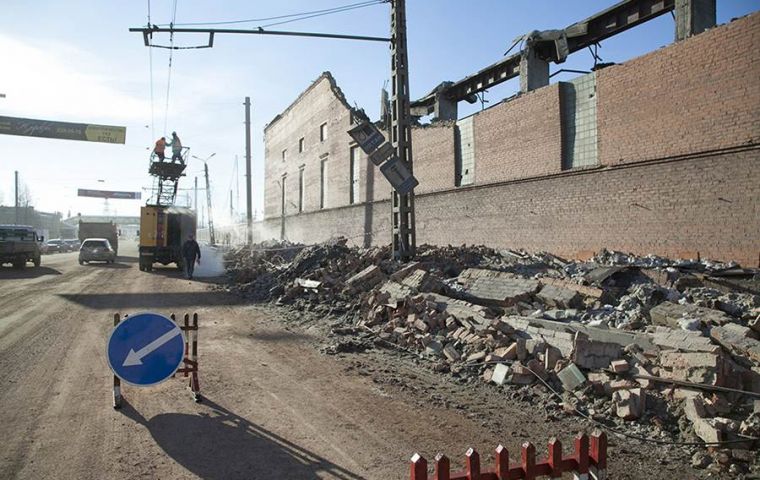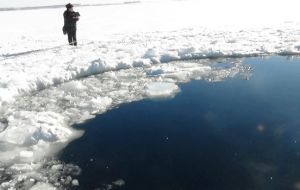MercoPress. South Atlantic News Agency
Russian meteor: 17 metres wide, weighed 10.000 tons and crashed at 64.373 km/h says NASA
 The devastating impact at the city of Chelyabinsk and the lake where it crashed
The devastating impact at the city of Chelyabinsk and the lake where it crashed The meteor that exploded over Russia Friday was slightly larger than previously thought and more powerful, too, NASA scientists say. The explosion over the city of Chelyabinsk, on Friday injured more than 1,000 people and blew out windows across the region in a massive blast captured on cameras by frightened witnesses.
NASA scientists estimated the meteor was space rock about 15 meters and sparked a blast equivalent of a 300-kiloton explosion. The energy estimate was later increased to 470 kilotons.
But later NASA revised its estimates on the size and power of the devastating meteor explosion. The meteor's size is now thought to be slightly larger, about 17 m wide with the power of the blast estimate of about 500 kilotons, 30 kilotons higher than before, NASA officials said in a statement.
The meteor was also substantially more massive than thought as well. Initial estimated pegged the space rock's mass at about 7,000 tons. Scientists at NASA's Jet Propulsion Laboratory in Pasadena, Calif., now say the meteor weighed about 10,000 tons and was traveling 64,373 km/h when it exploded.
“These new estimates were generated using new data that had been collected by five additional infrasound stations located around the world - the first recording of the event being in Alaska, over 6,500 kilometers away from Chelyabinsk,” JPL officials explained in the statement. The infrasound stations detect low-frequency sound waves that accompany exploding meteors, known as bolides.
The meteor entered Earth's atmosphere and blew apart over Chelyabinsk at 10:20 p.m. EST on Feb. 14 (03:20:26 GMT on Feb. 15). The meteor briefly outshined the sun during the event, which occurred just hours before a larger space rock — the 45 meters asteroid 2012 DA14 — zoomed by Earth in an extremely close flyby.
Asteroid 2012 DA14 approached within 27,000 kilometers of Earth Friday, but never posed an impact threat to the planet. The asteroid flyby and Russian meteor explosion had significantly different trajectories, showing that they were completely unrelated events, NASA officials said.
NASA scientists said the Russian meteor event, however, is a rare occurrence. Not since 1908, when a space rock exploded over Russia’s Tunguska River in Siberia and flattened 2,137 square km of uninhabited forest land, has a meteor event been so devastating.
“We would expect an event of this magnitude to occur once every 100 years on average” Paul Chodas of NASA's Near-Earth Object Program Office at JPL said. “When you have a fireball of this size we would expect a large number of meteorites to reach the surface and in this case there were probably some large ones”





Top Comments
Disclaimer & comment rules-

-

-

Read all commentsIt was funny watching the news Friday evening. A host of star gazers were out shivering with their telescopes on Blackheath waiting for the astronomical event of the year when a couple of hours earlier the meteorite event of the century was taking place in Russia. However the lucky ones with the most powerful telescopes did get to see a tiny blurry dot moving across their lens a little quicker than everything else. Corrrr....must've been exciting.
Feb 18th, 2013 - 11:03 am 010,000 tons and they can't find one bit of it. I'm sure a large amount burned up on entry but if, for example, a piece hit a building hard enough to knock wall down, then you hardly need to be Sherlock Holmes to figure out where they should be looking for it.
Feb 18th, 2013 - 04:18 pm 0They have been finding fragments all over the place - but just thumbnail size. I doubt there are parts any larger as it would simply disintegrate on impact due to the immense speed.
Feb 18th, 2013 - 04:27 pm 0Wish I'd been there - it must have been epic to witness.
Commenting for this story is now closed.
If you have a Facebook account, become a fan and comment on our Facebook Page!